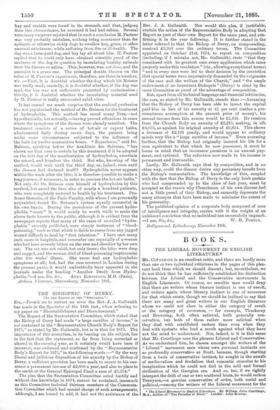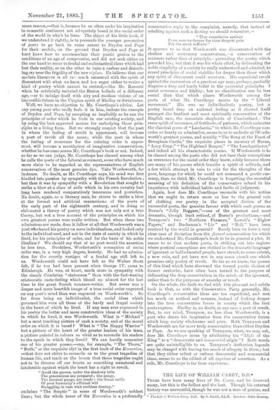BOOKS.
THE LIBERAL MOVEMENT IN ENGLISH LITERATURE.*
MR. COITRTHOPE is an excellent critic, and there are hardly more than one or two individual criticisms in the pages of this plea- sant book from which we should dissent; but, nevertheless, we do not think that he has sufficiently established his distinction between the Liberal and the Conservative movements in English Literature. Of course, no sensible man would deny that there are writers whose literary instinct is one of revolt,. and writers again whose literary instinct is one of reverence for that which exists, though we should be inclined to say that there are many and great writers in our English literature whom we could not class in either the category of revolt- or the category of reverence, — for example, Thackeray and Browning, both often satirical, both generally con- servative, but both of them rather more satirical when they deal with established custom than even when they deal with upstarts who lead a revolt against what they have not the mind to understand. Nor, indeed, is it in this sense that Mr. Courthope uses the phrases Liberal and Conservative. As we understand him, he classes amongst the writers of the " Liberal " movement men whose own personal instincts are as profoundly conservative as Scott, because, though starting from a basis of conservative instinct, he sought in the annals of medimvalism and feudalism that romantic stimulus to his imagination which he could not find in the cold and formal civilisation of the Georgian era. And so, too, if we rightly interpret the drift of one or two scattered hints, he would reckon Tennyson,—a genuine conservative of order, both social and political,—among the writers of the Liberal movement for the • TlieLamral Movement in English Literature. By William John Courthope„ M.A., Author of "The Paradise of Birds." London : John Murray. same reason,—that is, because he so often seeks his inspiration in romantic sentiment not adequately based in the social order of the world in which he lives. The object of his little book, if we understand it rightly, is to persuade the younger generation of poets to go back to some extent to Dryden and Pope for their models, on the ground that Dryden and Pope at least knew how to accommodate their poetic genius to the conditions of an age of compromise, and did not seek either on the one hand to recur to feudal and ecclesiastical ideas which had lost their reality, or on the other to raise a useless and disturb- ing cry over the frigidity of the new regime. He believes that our modern literature is all 103 much saturated with the spirit of discontent with what we have, and too eager either to revive a kind of poetry which cannot be revived,—like Mr. Rossetti when he artificially imitated the Breton ballads of a different age,—or to indulge itself with airy and rootless visions of an impossible future in the Utopian spirit of Shelley or Swinburne.
Well, we have no objection to Mr. Courthope's advice. Let any young poet who really feels it in him, imitate the example of Dryden and Pope, by accepting as implicitly as he can the principles of order which he finds in our existing society, and by using the best approved metres for embodying those prin- ciples in a living form. But we strongly suspect that the poet in whom the feeling of revolt is uppermost, will become a poet of revolt all the same ; while the poet in whom the feeling of reverence for the existing order is upper- most, will become a mouthpiece of imaginative conservatism, whether he has come across Mr. Courthope's book or not. Indeed, -so far as we can judge, Mr. Courthope has classed among what he calls the poets of the Liberal movement, some who have much more claim to be regarded as the representatives of English conservatism of the most genuine dye. Take Wordsworth, for instance. No doubt, as Mr. Courthope says, his mind was first kindled into passion by sympathy with the French Revolution ; but then it was by sympathy with a Revolution that sought to strike a blow at a class of evils which in his own country had long been rendered comparatively innocuous and powerless. No doubt, again, as a literary man, he strove to strike a blow at the formal and artificial mannerisms of the poets of the early part of the eighteenth century, and in doing so -elaborated a theory of poetry which was not only not a true theory, bat not a true account of the principles on which his own greatest poems were really written. But when these two admissions are made, does it follow at all that Wordsworth was a poet who based his poetry on mere individualism, and looked only to the individual soul, and not to the state of society in which he lived, for his principles of order, and for the basis of his noble idealism ? We should say that of no poet would the assertion be less true. Doubtless, Wordsworth's conception of social order was, in a very high degree, homely. He had no admira- tion for the courtly vestiges of a feudal age still left to us. Wordsworth could not have felt as Sir Walter Scott felt, if he too had been present when George IV. came to Edinburgh. He was, at heart, much more in sympathy with the simple Cumbrian " statesmen " than with the fast-waning aristocratic caste-feeling which blazed up almost for the last time in the great Scotch romance-writer. But never was a deeper and more heartfelt image of a true social order engraved on any poet's mind than was engraved on Wordsworth's. So far from being an individualist, the social ideas which governed him were all those of the hardy and frugal society in the heart of which he lived. If any man ever expressed in his poetry the better and more constructive ideas of the society in which he lived, it was Wordsworth. What is " Michael " but a most touching picture of such a society, and of the moral order on which it is based ? What is " The Happy Warrior" but a picture of the heart of the greater leaders of his time, a picture painted in colours so vivid as to reconcile his readers to the epoch in which they lived? We can hardly remember one of his greater poems,—say, for example, "The Thorn," " Ruth," or the exquisite idyl in the first book of the Excursion, —that does not strive to reconcile us to the great tragedies of human life, and teach us the lesson that those tragedies ought not to be thrown off our hearts as something unnatural and intolerable against which the heart has a right to revolt.
" Amid the groves, under the shadowy hills The generations are prepared ; the pangs, The internal pangs, are ready ; the dread strife Of poor humanity's afflicted will
Struggling in vain with ruthless destiny,"
exclaims "The Sceptic" in some of Wordsworth's noblest lines ; bat the whole tenor of the Excursion is a profoundly conservative reply to the complaint, namely, that instead of rebelling against such a destiny we should remember,—
" That consolation springs
From sources deeper far than deepest pain For the meek sufferer."
It appears to us that Wordsworth was discontented with the shallow and customary conservatism,—a conservatism of manners rather than of principle,—pervading the poetry which preceded his ; but that it was his whole effort, by delineating the noble simplicity of a society he really understood and admired, to reveal principles of social stability far deeper than those which any spirit of discontent could overturn. His superficial revolt against the mannerism of a previous age may, perhaps, partially disguise a deep and hardy belief in the perennial principles f social reverence and fidelity ; but no classification can be less sound than that which places Wordsworth among the poets of what Mr. Courthope means by the " Liberal movement." His was no individualistic poetry, but a poetry based deep on national feeling as it showed itself amongst the hardiest and most spiritually conservative of the English race, the mountain shepherds of Cumberland. - The same spirit of reverence, of fortitude. of patience, which animates the classical poem of "Laodamia," to which Mr. Courthope con- cedes so hearty an admiration, seems to us to underlie al IWords- worth's greatest poems, and notably "The Song at the Feast of Brougham Castle," the exquisite pieces in memory of Burns, " Lucy Gray," "The Highland Reaper," "The Leechgatherer," and indeed all his characteristic poems. If Wordsworth is to be classed among the poets who did not base their conceptions on reverence for the social order they knew, solely because there are many of his poems which breathe a spirit of solitude, and a few which attempt in vain to coin for the thoughts of the poor, language for which he could not command a poetic cur- rency, then we think Mr. Courthope is forgetting the essential meaning of his definition of the conservative school in his impatience with individual habits and faults of judgment.
Again, how does Mr. Courthope reconcile with his notion that we ought to return more or less to the general rule of clothing our poetry in the accepted diction of the successful poets, the genuine favour with which such poems as Burns's "Jolly Beggars,"—one of the greatest and most dramatic, though least refined, of Burns's productions,—and Tennyson's two " Northern Farmers," Lowell's " Biglovr Papers," and Buchanan's " Liz " and "Nell," have been received by the world in general? Surely here we have a very clear case of deviation from the formal conservatism for which we understand Mr. Courthope's book to be in general a plea. It seems to us that modern poets, in striking out into regions where poetical conceptions are clothed in the dramatic language of ignorant or half-educated people, have struck, to some extent, a new vein, and yet have not in any sense struck one which promises only poetry of revolt. So far as we know, the poems of this kind which have disowned the formal poetic diction of former centuries, have often been turned to the purpose of delineating the deep conservatism in the minds of the ignorant, rather than to the purposes of anarchy or revolt.
On the whole, the fault we find with this pleasant and subtle book is that, as with the Conservative Party generally, Mr. Courthope's conservative ideas are too superficial, and rest too much on method and manner, instead of looking deeper into the true conservative forces in society which the best poets express. Shelley is, no doubt, in any case a poet of revolt. But, to our mind, Tennyson, no less than Wordsworth, is a poet who draws his inspiration from the conservative forces which keep society wholesome and pure. Both Tennyson and Wordsworth are far more truly conservative than either Dryden or Pope. As we are speaking of Tennyson, what, we may ask, does Mr. Courthope mean by attributing his "Idyls of the King " to a " democratic and commercial origin " ? Both words are quite unintelligible to us. Tennyson's Arthurian legends may be charged with having too much of allegory in them ; but that they either reflect or enforce democratic and commercial ideas, seems to us the oddest of all caprices of assertion. As a rule, Mr. Courthope is far from capricious.



































 Previous page
Previous page